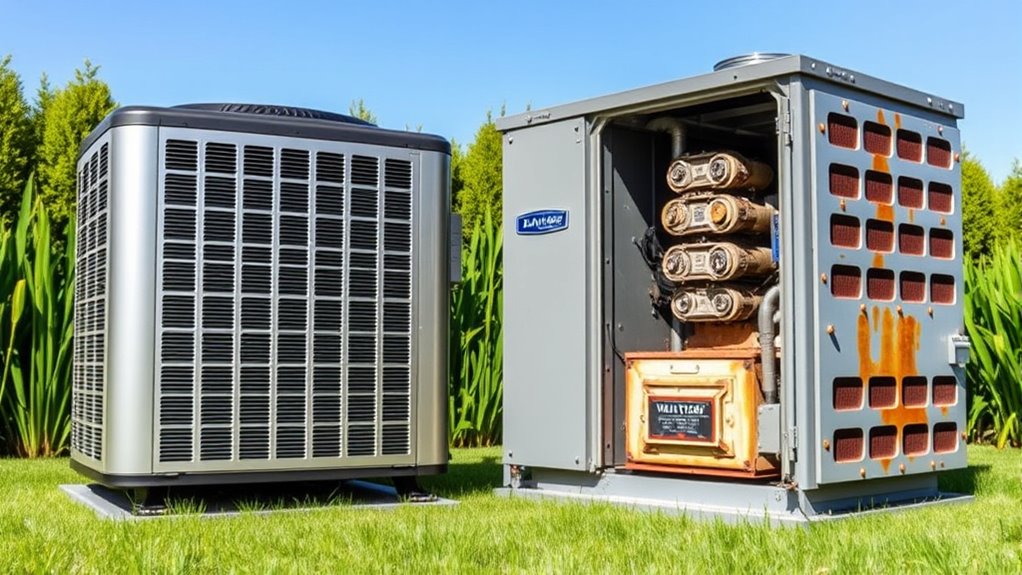Heat pumps and furnaces typically last around 10-15 years with proper maintenance. Heat pumps are more energy-efficient in milder climates and may have a lifespan similar to or slightly shorter than furnaces. Gas furnaces can last up to 20 years if well taken care of. Your choice depends on climate and usage, but regular upkeep helps extend both systems’ lives. Explore further to discover tips on maximizing your HVAC system’s lifespan.
Key Takeaways
- Heat pumps typically last 10-15 years, similar to air-source models, while furnaces can last up to 20 years with proper maintenance.
- Furnaces often have a longer lifespan but may require more repairs than heat pumps over time.
- Both systems’ longevity depends heavily on regular maintenance and proper operation.
- Heat pumps are more energy-efficient in moderate climates, potentially extending their effective lifespan.
- Proper upkeep, including filter changes and inspections, can significantly prolong the lifespan of both heat pumps and furnaces.

Your HVAC system typically lasts between 10 and 15 years, but several factors can influence its lifespan. One of the most important is energy efficiency, which directly impacts how long your system remains effective and reliable. An energy-efficient system not only saves you money on utility bills but also tends to experience less strain, reducing wear and tear over time. To maximize your system’s lifespan, it’s essential to follow proper maintenance tips. Regularly changing filters, scheduling annual inspections, and keeping the unit free of debris can prevent small issues from turning into costly repairs or early replacements. When your system operates efficiently, it doesn’t have to work as hard, which extends its overall durability.
Heat pumps and furnaces differ markedly in their design and operation, which influences their longevity. Heat pumps are generally more energy-efficient because they transfer heat rather than generate it, making them a popular choice for milder climates. They tend to last around 10 to 15 years but can sometimes push beyond that with proper maintenance. Furnaces, especially those powered by gas, often have a similar lifespan but might require more frequent repairs as they age. Because they generate heat through combustion, they’re more susceptible to wear on components like burners and heat exchangers. However, a well-maintained furnace can last up to 20 years, especially if you follow maintenance tips like cleaning vents and scheduling professional tune-ups regularly.
When comparing heat pumps to furnaces, consider not just lifespan but also overall energy efficiency. Heat pumps typically consume less energy in moderate climates, which can lead to longer-term savings and less strain on the system. Furnaces might be more suitable for colder regions but could be less efficient and require more frequent repairs, reducing their effective lifespan. Regardless of which system you choose, sticking to maintenance tips—such as inspecting ducts for leaks, ensuring proper refrigerant levels, and addressing minor issues promptly—can considerably extend their operational years. Proper maintenance and understanding of each system’s unique needs help ensure your investment lasts as long as possible, providing consistent comfort and saving you money in the long run.
Frequently Asked Questions
How Often Should I Schedule Professional HVAC Maintenance?
You should schedule professional HVAC maintenance at least once a year, ideally before peak seasons. Regular maintenance helps guarantee your system runs efficiently and lasts longer. For heat pumps and furnaces, a bi-annual maintenance schedule is often recommended, once in fall and spring. Regular professional service keeps your system in top shape, prevents costly repairs, and maintains ideal comfort in your home. Don’t skip your annual checkups to keep things running smoothly.
Can a Heat Pump Effectively Heat a Large Home?
Yes, a heat pump can effectively heat a large home, especially if you have zoning systems and proper insulation improvements. Zoning allows you to control temperatures in different areas, making heating more efficient. Additionally, enhancing your insulation minimizes heat loss, helping the heat pump perform better in larger spaces. Regular maintenance and clear understanding of your home’s needs guarantee your heat pump keeps your large home warm efficiently.
What Are the Energy Cost Differences Between Heat Pumps and Furnaces?
Imagine your energy bill as a river—heat pumps often flow smoother and cheaper than furnaces. You’ll see better energy efficiency with a heat pump, cutting your costs and saving you money over time. While furnaces might have a lower upfront price, heat pumps excel in cost savings through lower operating expenses. So, for long-term savings, heat pumps are like a steady stream of savings that keeps flowing.
Do Heat Pumps Perform Well in Extremely Cold Climates?
In extremely cold climates, heat pumps can perform well if they’re designed for cold climate efficiency. Modern cold weather heat pumps maintain good heating performance even when temperatures drop below freezing. However, their durability can be challenged by prolonged cold exposure, so it’s essential to choose a model built for harsh conditions. Regular maintenance also helps guarantee peak performance and longevity, making heat pumps a reliable option in colder regions.
How Can I Extend the Lifespan of My HVAC System?
Did you know regular maintenance can extend your HVAC system’s life by up to 50%? To keep it running smoothly, follow maintenance tips like replacing filters, cleaning coils, and inspecting ductwork. Consider system upgrades, such as modern thermostats or energy-efficient components, to reduce strain and improve performance. Staying proactive helps prevent costly repairs, prolongs your system’s lifespan, and keeps your home comfortable year-round.
Conclusion
In the gentle dance of seasons, your HVAC system tends to drift gracefully through its years, much like a seasoned traveler on a well-worn path. Heat pumps and furnaces each have their unique journey, whispering stories of reliability and comfort. By choosing wisely, you’re guiding your home’s harmony, ensuring it continues to embrace you warmly, season after season. With thoughtful care, your system will remain a steadfast companion, quietly supporting your comfort for many seasons to come.









